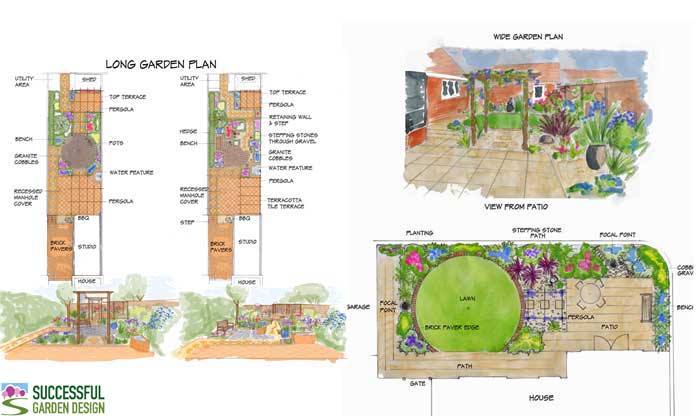
City gardens can be tricky to design because they are often small and very overlooked.
City Garden Design Tips
- The main thing you need to do with any small garden is to visually make the most of the space.
Any design shape you use for your patio or lawn areas needs to accentuate the width if the garden is long and narrow. Or the length if the garden is wide and shallow. Simple shapes work the best for this as shown in the plans below…

If you have a square garden then you need shapes that will both enhance the length and the width.

Size is everything!
2. Choose smaller size materials to make the space look larger.
When our eyes see a lot of something we automatically assume the area is large. So choose the smallest size paving you can find. And avoid large paving slabs and blocks, they will make your garden look smaller than it is!

Seclusion
3. Screen out the neighbours.
This is usually high on people’s wish list because they don’t want to be overlooked but it’s important visually too.
It’s not always possible to have trees in urban gardens so tall plants like non-invasive species of bamboo and grasses make excellent screens and will help your garden to feel more like a garden. And more importantly, you can create a feeling that you’re in a natural space and not a city. Tall planting can also help reduce traffic noise.

I’ve written more in-depth on many different screening methods here.
Split it up
4. Divide the space
Even in really tiny gardens, it’s usually possible to visually divide up space. Why would you want to do this? Creating more than one ‘room’ will make the garden look larger.
In really small gardens you can do it subtly by having the planting borders pinch in a little bit at key points and that is usually enough to give the sense of separate areas without doing anything drastic.

Go up!
5. Utilise your fences and walls.
With small space gardens, it’s important to utilise every last bit. So think vertically. You can use pergolas, arches and other structures to create vertical interest as well as doing it with planters up walls and fences.

You do need to be careful when placing a pergola as not every garden can take it. I’ve written more about how you know in this pergola and arches article.





